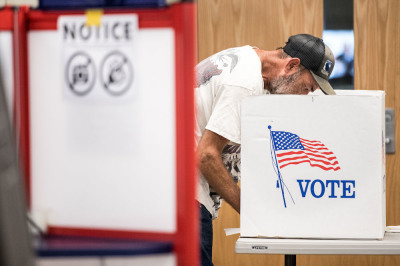What if we don't consider winning when we vote

In the aftermath of the midterm elections, the Christian Post published three articles related to the vote. Each article is worth our time as followers of Jesus. One focused on the takeaways from the election results. Another focused on the importance of remembering our calling regardless of who is in office. And the third focused on how followers of Jesus should vote.
Each one has its merits. But each of them assumes a two-party system. Thus, to the extent they offer commentary or counsel on how followers of Jesus should vote, they are limited.
The vast majority of our discussions about voting take place within a two-party context. The two parties can often be described in a variety of ways: Democrat and Republican, liberal and conservative, left and right, progressive and MAGA.
Regardless of how the two parties are described, it comes down to “us” and “them." And “they” are so radical that “they” can’t be allowed to govern.
Not surprisingly then, the purpose of our vote is not so much about electing men and women of high moral character who display Kingdom values as it is about winning, or at the very least, not allowing “them” to win. As a result, winning is not everything, it is the only thing.
Perhaps understandably so.
Many of us believe, as Donna Rice Hughes states in her article, that
“America stands at a spiritual, cultural, economic and political crossroads. Today's midterm elections are perhaps the most significant in decades, the outcome of which can dramatically change the trajectory of our nation, for good or for evil.”
In other words, the stakes are high.
But as Dr. Michael Brown notes in his article, our calling as followers of Jesus remains the same, regardless of who runs the government.
Then why are we so obsessed with winning?
How else to explain how Dr. Brown, in the preface to his book, “The Political Seduction of the Church, How Millions Of American Christians Have Confused Politics with the Gospel” could express his “realized” concern that “many Christians” “were becoming as mean-spirited and divisive as their president” but then, despite his concerns, vote for this mean-spirited and divisive president in 2020.
Are we really fulfilling our call to love our neighbors by voting for someone who is mean-spirited and divisive? That is doubtful. But I suspect that Dr. Brown’s vote was not so much about voting for a candidate. Given his concerns about “a very destructive leftist agenda,” he was voting against a candidate.
To be fair, Dr. Brown is not alone.
So, how do we fulfill our call, as described by Dr. Brown “to be the salt of the earth, functioning as the moral conscience of the state and as a preservative element in the society?”
By fulfilling another call, as described by Dr. Brown, “to be holy and set apart, in the midst of an evil world.”
In the political arena, I suggest this means prioritizing the fulfillment of our calling over the winning of elections. Among other things, “being holy and set apart” means not voting for (and not positively reinforcing the behavior of) candidates who are “mean-spirited and divisive” or who advance a “destructive agenda?”
The state of the nation and its politics today have resulted in tens of millions of people who are not enamored with either candidate. Voters are casting their vote to keep “the other” candidate out of office. Voting for what some might consider the lesser of two evils does not demonstrate holiness nor set us apart.
I suggest that being holy and set apart in the political means, and excuse me if you have heard this before, voting our values. In her article, Donna Rice Hughes presents some excellent guidance. Make a decision to vote based on what God says in His Word, assess the character, integrity and consistency of the candidate, and then research the position of the candidate, their party and their policies on issues we care about.
But voting our values can be difficult. As Mrs. Hughes points out,
“How do we wisely discern how to vote when we agree with some of the policies of a candidate or political party, but not all of them? What if we are in agreement with the policies and direction of a party platform or policy, but don’t like the personality of the politician running for that office?”
These questions are made more difficult when our choice of candidates or political parties is limited to just two options.
Thus, I would make a friendly amendment to her counsel to “vote for the candidates, party and policies that best align with Judeo-Christian values” by adding “regardless of their chances of winning.” When the chance of winning is not a consideration, we are more likely to expand our options to include candidates who are neither Republican nor Democrat.
When we increase the number of candidates we are willing to consider, we increase the likelihood of finding a candidate whose character, positions, and policies reflect Kingdom values.
In many, but not all, cases this will mean voting for a major party candidate not endorsed by the party’s leadership or voting for a “third party” candidate, like the American Solidarity Party.
Will doing so mean that “the ‘other’ candidate will win?” Most likely, yes. Will many of us feel like we are on the outside looking in as a result? Yes, for a time that will certainly be the case. It won’t be the first time in our history as followers of Jesus.
As Dr. Brown noted:
“generations of believers, beginning with the very first disciples, lived and died with slavery and infanticide and other barbarous practices as a way of life, the cultural norm. It took centuries before these evil things were abolished or went out of practice. Yet the gospel continued to march on.”
But America is not first-century Rome and Christians in America do not lack influence. Christians vote in enough numbers to make a difference. Candidates are already on ballots who value unity and make decisions and take stands based on Kingdom values.
If tens of millions of Christians voted for these values, then candidates who display these values might become viable sooner than we might believe possible. It would take some time but certainly not decades to shift the landscape from choosing the lesser of two evils to voting for men and women who display Kingdom values.
The real question isn’t how much time it would take to bring about such a shift. The real question is do we trust God’s system more than the American political system? As Dr. Brown stated: “Regardless of the outcome of the elections, my hope remains where it has always been, in one place only: our unshakable God and His Kingdom.”
If our hope is in God, then winning elections need not be everything and we can uphold our values in the voting booth as well as in the town square.
Greg Wallace regularly teaches, writes, and consults on leadership, change, and governance in the corporate, non-profit, and ministry arenas. He is the Chief Academic Officer of Wagner University, an online Christian university in Rancho Cucamonga, California. In this role, Greg builds the capacity of leaders to meet their own definition of success. He builds the capacity of organizations as well as leaders as the president of his own enterprise, The Wallace Group, and its ministry arm, KG Ministries. He and his wife, Linda, parent a blended family of four adult children and six grandchildren.




























